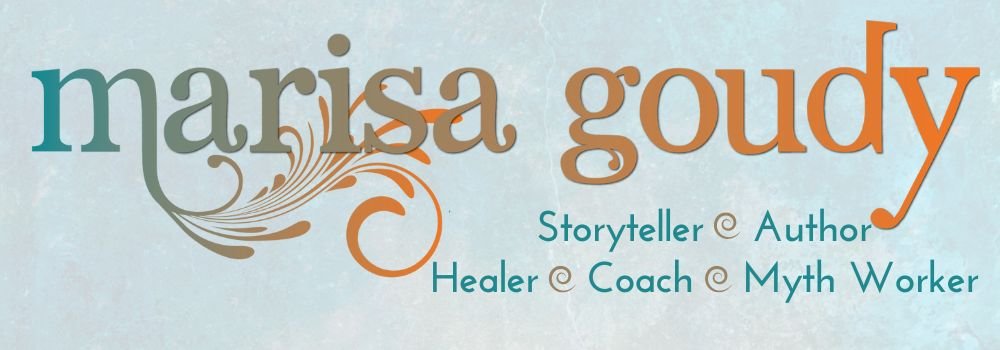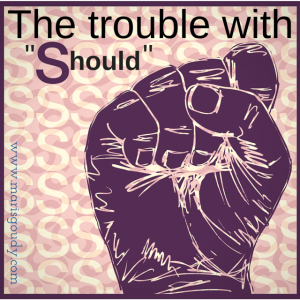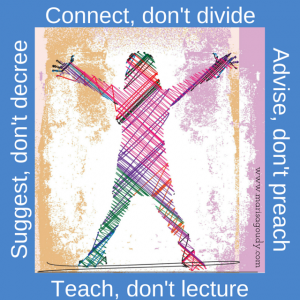MG_Header_w_biline_hires
Sovereign Standard, Issue 38Words are like playthings.
The amuse. They teach. They inspire. They’re the building blocks of story.
But words can also be discarded toys, spread all over the floor. Just more clutter. Meaningless and forgotten.
When mindful people (and professionals) use words mindlessly
How to say the right thing when every word matters. On writing and speaking your truth by Marisa Goudy.
Writers, healers, and clinicians whose work relies on talking it all through... Words are at the heart of what we offer. Even though language has its limits, we count on words to mean something.
And yet, I know I’m guilty of using words mindlessly.
Lapsing into profanity when I’m tired or “in a mood. ” Barking conflicting commands as I try to rally my first-grader to the bus stop. Just throwing together a bio for a social media profile without thinking about whether I am sharing the most important parts of my story.
Everyone has heard “do as I say, not as I do.” For many of us, “do as I do, not as I say” is often just as applicable.
In part, this refusal to "mind the mouth" is a stand against political correctness. It’s rebellion in the face of mindfulness.
Some of this mindless use of words is to be blamed on the influence of the culture - particularly when violence creeps into our metaphors.
And, frankly, sometimes it’s just exhaustion. It’s hard to keep track of every word when you're in a state of constant communication.
If some words matter, all words matter
I am compassionately declaring an end to my hypocrisy:
If some words have power, then all words have power. And I'm going to try my best to use my power wisely.
[tweetthis]If some words have power, all words have power. I'm trying to use my #writing powers wisely[/tweetthis]
The hurtful words and the healing words. All the language that falls in between that great spectrum of thought. Every word is important in the spells you cast, in the messages you’re sending out into the world.
“It’s just a throwaway comment” isn’t an excuse you can fall back on when you assert that words have power and resonance.
(Believe me, I am not completely happy about this pronouncement. The last thing I need are more rules or complications. But stick with me - there are lights every few feet along this tunnel into the underbelly of how we communicate!)
The resistance: nobody likes the word police
Engineers hate being married to English majors.
Oops… I just threw out “hate” and made a sweeping generalization there. I know it’s not really true. And I am almost sure that you know that I know it’s not true, but I wanted to get your attention and it felt like a fun, clever way to introduce this next point.
You see, paying close attention to your words doesn’t mean that you have to become a milquetoast writer… You just have to know when you’re throwing a bomb spiked with letters and punctuation.
When my husband and I are debating (ok, I should probably say “arguing”), I sometimes ask if he really means what he just said, because "I do no think that word means what you think it means." I tell myself I am seeking clarity and connection, not being a vocabulary zealot. And I am hoping he thinks “cute Princess Bride quote.”
Unfortunately, he doesn't like it when he feels the dictionary policewoman is calling him to task on imprecise language. “Sorry, we can’t all have master’s degrees in English!” he’ll remark.
To be fair, sometimes distracted English majors get irritated with their techy mates.
I often ask Husband to pass me “the thingie that we use to fix the baby’s toy with the stupid broken bit.” He smirks, asks whether I want the phillips head screwdriver to repair the cracked battery door, and takes care of it himself. “Sorry, we can’t all build robots for a living,” I sigh.
As a writer and thought leader-in-training you owe it to yourself to analyze your word choices
Though potentially quite illuminating, analyzing word choice in the midst of conversation feels pretty tedious. Fortunately, reviewing the way you choose and use words in your own writing is much less stressful - and quite unlikely to result in either spouse sleeping on the couch.
Thanks to the direction of my brilliant sales coach, Tami Smith, I am examining the “threads” that have shown up repeatedly in my work over the last year. It’s a quest to uncover my recurring words, concepts, and images.
This is my opportunity to pause and look at the common elements in my own stories. It’s helping me understand how I’ve been defining and living my signature concepts, Sovereignty and the Sovereign Story - often without even knowing it.
In this case, the unconscious use of language is helpful and revelatory.
Shut up, listen to yourself, and do some research
There are certain words you use again and again. Over time, you inhabit their meaning. You then expand and redefine what these words mean to better express your unique vision.
This expansion and redefinition process can be organic and even accidental as you write into a term, use it in your daily life, and shape it with your experiences.
But then, there’s even more to learn when you close your mouth, put down the pen, and start listening to yourself.
When you pause to dig into a beloved word’s history and connotations, these fresh ideas push the boundaries of your work even further. And reaching your edge beautiful thing.
Some insight into one of the mindful professional’s favorite words
One word I use constantly is “insight.”
I am drawn to insight because it folds information, knowledge, and wisdom together into a nice, two syllable package. I want to be seen as someone who is insightful and I want to be someone who opens readers and clients to their own insights.
The former academic in me cringes when I cite Wikipedia rather than go to primary source materials, but I’m giving myself permission, just this once. That’s what Wikipedia is for after all - it guides you in the initial “I wonder…” stage and then open doors to further inquiry.
Adapted from the entry on insight, the word can generally be defined as:
The capacity to gain an accurate and deep intuitive understanding of a person or thing.
Suddenly seeing a problem in a new way, connecting the problem to another relevant problem/solution pair, releasing past experiences that are blocking the solution, or seeing problem in a larger, coherent context.
In psychology, insight
occurs when a solution to a problem presents itself quickly and without warning
can mean the ability to recognize one's own mental illness
In marketing, insight
is a statement based on a deep understanding of your target consumers' attitudes and beliefs, which connects at an emotional level and provokes a clear response
Suddenly, what I thought was a nice, broad term related to imparting truths and gaining understanding reveals itself to be an important term in the field of psychology. Now, I will use it more mindfully in copy that’s directed at the clinicians in my audience. I’ll also be able to use it more skillfully in writing coaching consults and copywriting jobs for therapists.
And it’s meaningful to note that “insight” is also a marketing term. I instinctively knew that we all need insight into our ideal clients and readers, but I had no idea it was a “real” buzzword (at least according to the anonymous strangers who created this Wikipedia article).
Owning the power of words is a brave, necessary, challenging act
Once you admit to yourself that every word does have a measure of power, you can’t teach your child that old “sticks and stones” rhyme in good conscience. You can’t write off sexist or homophobic remarks as mere teasing. Never again can you ignore any threats that someone makes to herself or others.
Sounds… earnest.
If you’re a semi-irreverent soul like me, someone who doesn’t much like formalities and who thinks creativity is about coloring outside the lines, it sounds like a rather uptight way to move through life.
That’s just my fear of change speaking. I'm afraid of holding myself to a kinder, more conscious standard because I'm afraid I'll fail.
In truth, playing it fast and loose and talking or writing yourself into corners (“I know I said that, but, actually, I meant…”) is actually a much more restrictive way to live.
Yes, as you become what Don Miguel Ruiz calls “impeccable with your word,” you’ll irritate some people. You'll fall into old "whatever" speech patterns. You'll go for easy but dangerous metaphors rather than articulating your healing truth.
Trust yourself. Forgive yourself. Speak for your best self. Stand sovereign in your dedication to telling a story that you’re proud to claim as your own. Writing coaching by Marisa Goudy.
Trust yourself. Forgive yourself. Speak for your best self.
Stand sovereign in your dedication to telling a story that you’re proud to claim as your own.
Can you commit to mindfully choosing your words? Let me know you're with me in the comments and please share this post with your community.







